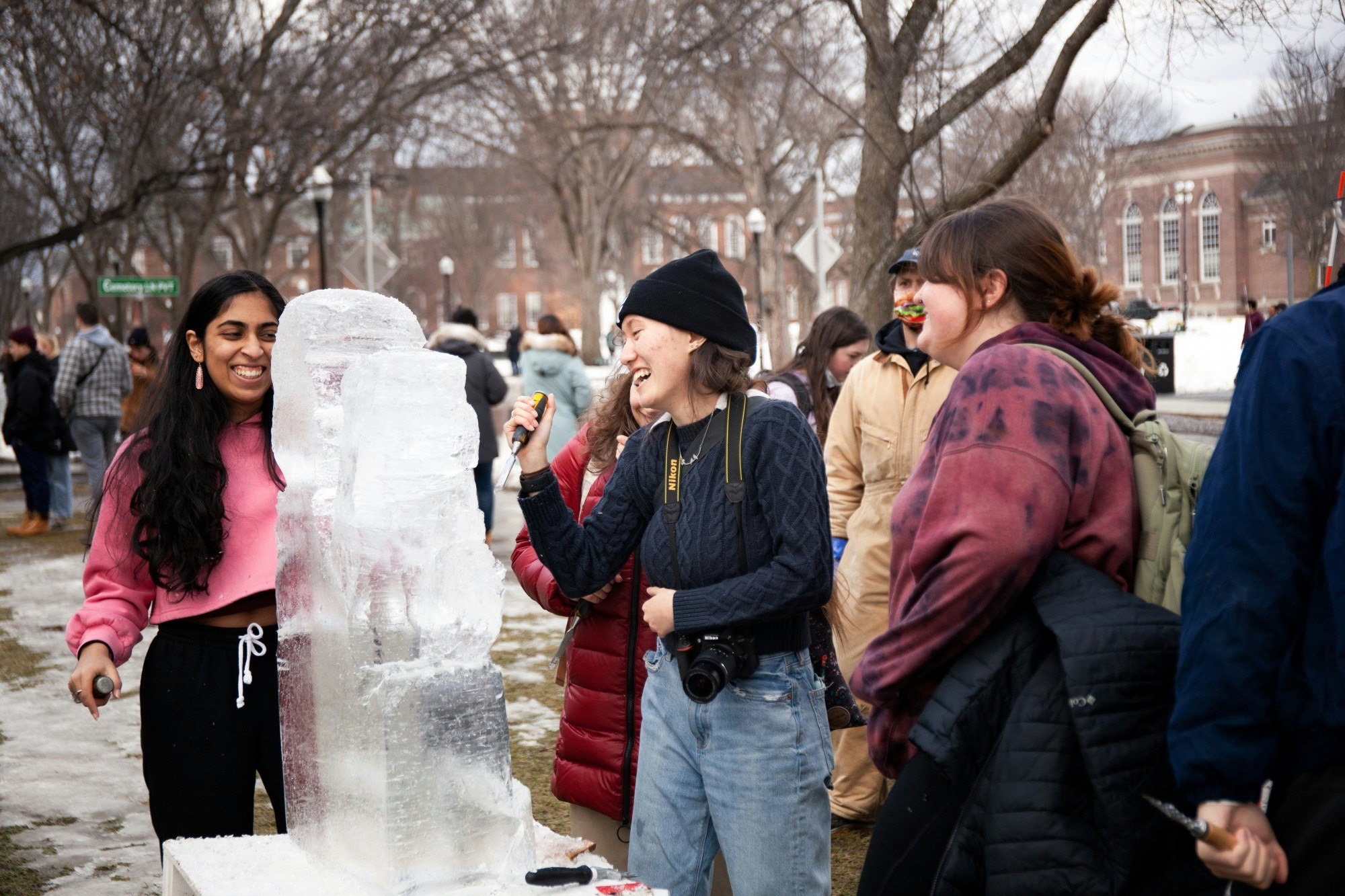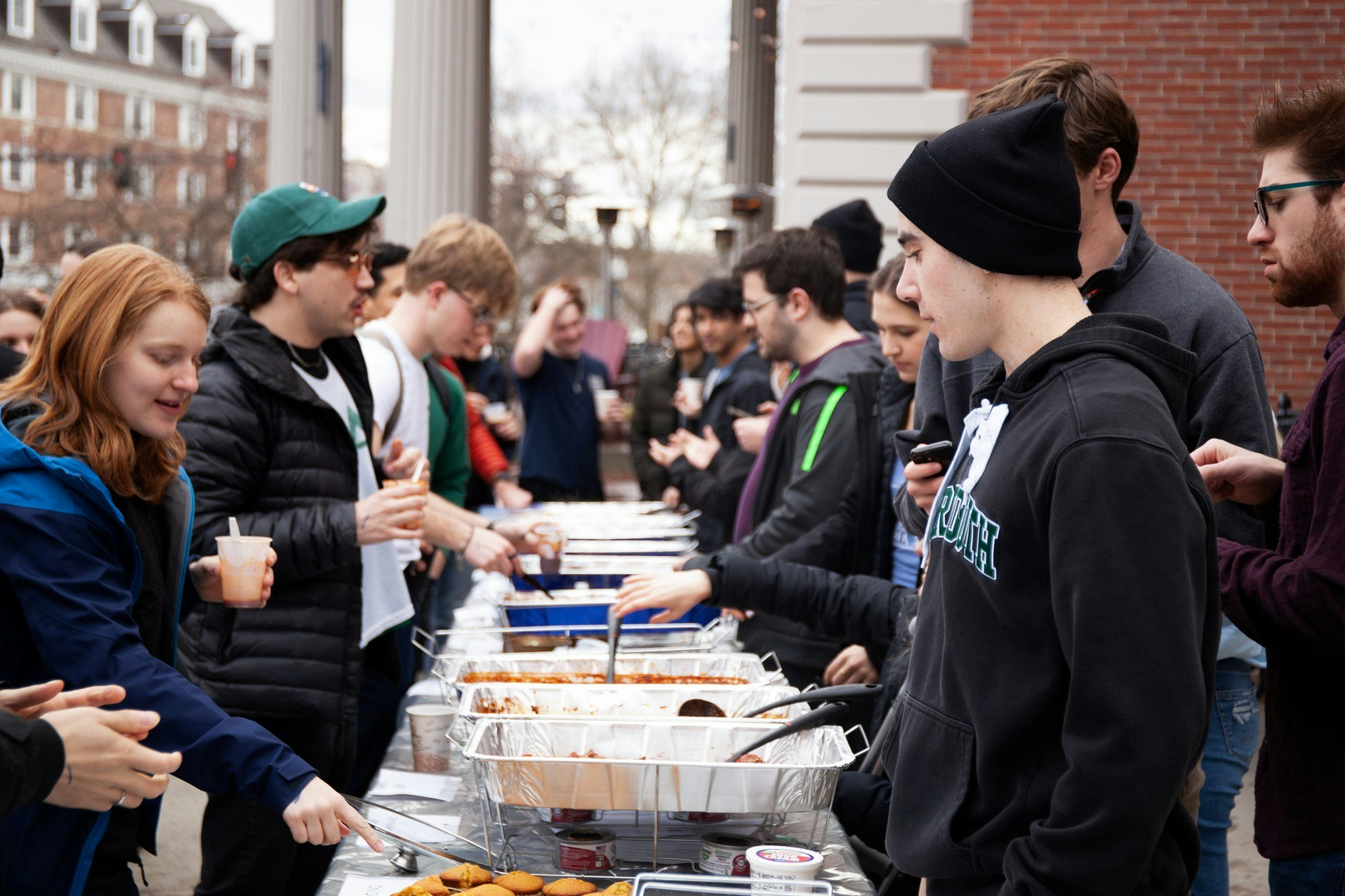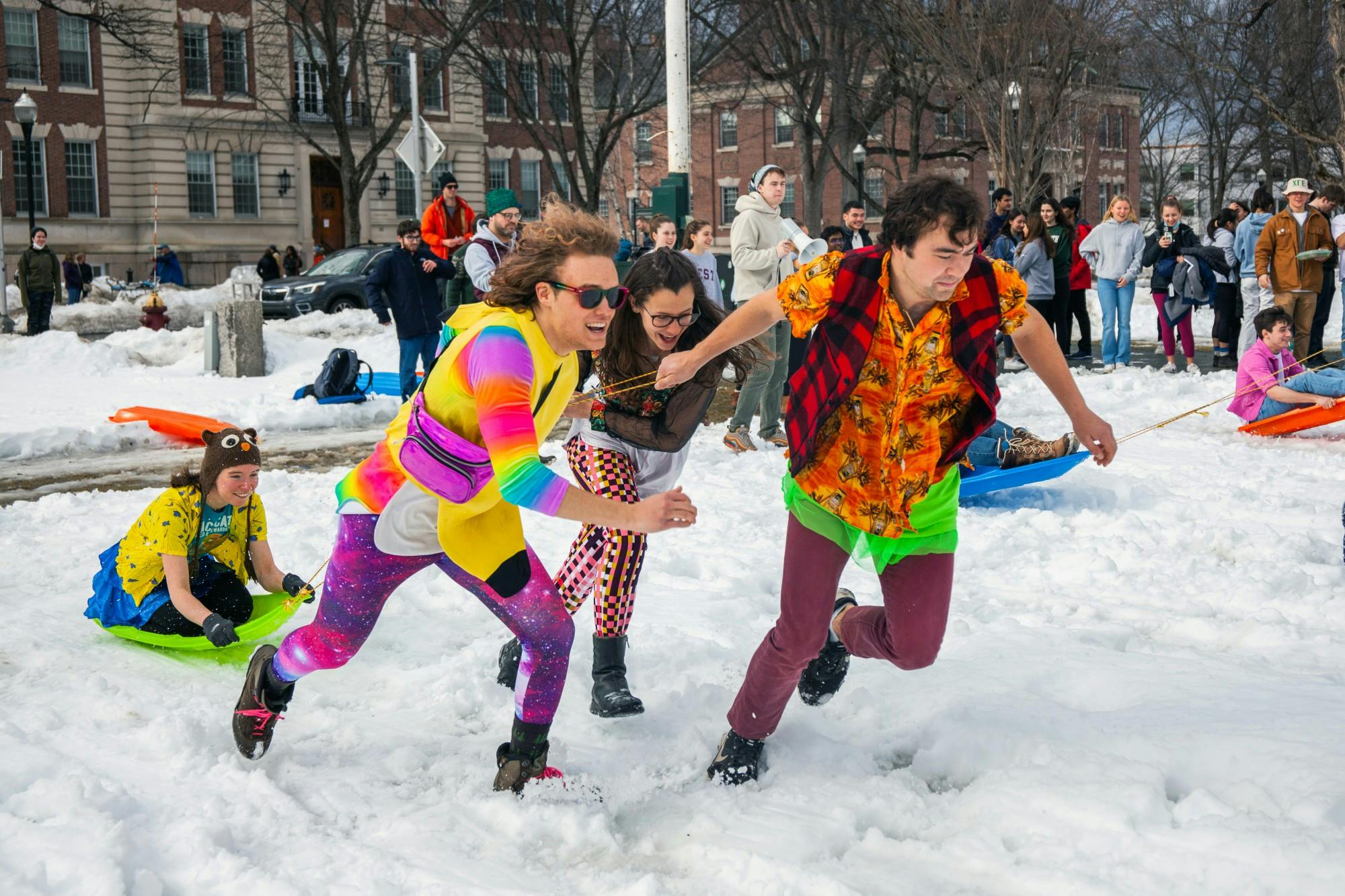This year’s return to an in-person Winter Carnival themed “Mission: Winter Carnival — License to Chill” saw successful turnouts for activities like the polar bear plunge and Phi Delta Alpha’s Annual Chili Cook-Off, but dwindling interest in planning events and the building of the snow sculpture.
The polar bear plunge in Occom Pond, returning after a pandemic-induced hiatus, was especially well attended.
“It meant a lot because it’s been so long since we’ve had a [normal Winter Carnival],” Winter Carnival council chair Chris Cartwright ’21 said. “Last year’s carnival was very different, but even before that, it was the first year in three or four years we’ve had a polar bear plunge.”
Cartwright said he was “happy to be able to have that tradition happen,” given that “it’s kind of always up in the air because of [the] weather.” According to Cartwright, this year’s polar bear plunge saw over 1,200 participants, surpassing the previous record of 800.
“Despite [everyone] saying that ‘It wasn’t that bad,’ it was cold,” participant Namitha Alluri ’25 said. “But it was exhilarating.”
In addition to the plunge, Alluri said she volunteered as a dealer at the “Casino Royale” themed night at Collis After Dark, which she noted was her favorite day of the weekend.

Ardelle Ning ’22 said she participated in the polar bear plunge and Saturday’s human dog sled race. As a senior, she said she wanted to ensure she took advantage of her “last chance” to join in on the festivities.
“It’s really nice that Dartmouth really celebrates what winter is about and provides all these activities to give students the chance to take some time off from classes and enjoy the weather, despite how freezing it is,” Ning said.
While students were eager to participate in the plunge, Cartwright noted less excitement around organizing it. He added that the Council was worried, not because of the weather, but because of a shortage in volunteers to run the event. While they were able to make a push to recruit organizers for the plunge, they were less successful in other events, he said.
Cartwright said he began his involvement in Winter Carnival by helping to revive the snow sculpture competition, which he described as on its way to “dying out” a few years ago.
“The snow sculpture has always had trouble getting a lot of volunteers because it’s such a labor-intensive tradition,” Cartwright explained.
Snow sculpture chair Cady Rancourt ’24 said the event is an “almost 100 year old tradition … where students come together and design and build a sculpture within the theme of winter carnival.” This year, Rancourt said she had trouble getting students to volunteer on workdays, which forced plans for a 20-foot sculpture to be scaled down to about seven feet tall.
Rancourt attributed a lack of student volunteers to this Winter Carnival being the first both for ’25s and many ’24s.
“[There is a] generational gap where we have almost half of our student population that doesn’t really understand what Winter Carnival is or once was,” Rancourt said.
Rancourt added that the rigor of the academic term at Dartmouth may have been an additional contributing factor.
“It’s a wider commentary on how much students are being asked of on the daily and how stressful that can be, and ultimately, how that leads to the demise of traditions like Winter Carnival.”

Cartwright said he partially attributes this gap to the pandemic.
“Normally these events and clubs continue through people being aware of how it previously ran, but because of [COVID-19], we had to start from scratch … because so many people haven’t done it before,” Cartwright said.
In addition to the lack of volunteers, the warm weather presented another obstacle.
“Within the first day, [the melting snow] obscured any detail we had spent hours carving … ruining the sculpture very quickly,” Rancourt said.
In general, when it comes to the College’s main events each term — Homecoming, Winter Carnival and Green Key — Cartwright said that Winter Carnival is “the most student-driven because all of the events have to be run by students.”
“Partly, post [COVID-19], all of the classes are less aware that these things don’t just happen of their own accord,” Cartwright said. “[But] these things only happen with a lot of student involvement.”
Safety and Security director Keysi Montas said that it was a “rather tame” weekend. He said there were no arrests that he is aware of, and that there were two Good Samaritan calls that resulted in students being transported to Dartmouth-Hitchcock Medical Center. In regards to the plunge, Montas said the team prioritized safety and fun.
“We were there to manage the crowd to make sure everyone was safe, did their plunge, and had the best possible outcome,” Montas said.

In addition to the plunge and spy-themed events, this Winter Carnival marked Phi Delta Alpha’s 10th Annual Chili Cook-Off in support of the Fisher House Foundation, an organization that supports military personnel and their loved ones who have been hospitalized.
“Every week, we have a few brothers participate in cooking for the entire house, so we extended that tradition to the entire campus … while also raising money for a good cause,” Cook-Off organizer Zach Martel ’24 said.
Martel said he was “really happy with the turnout,” adding that the event raised over $1,000 for the foundation and that about 200 people attended the event.
Katelyn Zeser ’22 entered in the chili competition with Alpha Xi Delta sorority and said that their recipe — which ended up winning the cook-off — “has been in AXiD for several generations.” Zeser added that she also participated in the Chili Cook-Off two years ago in the last cook-off before the pandemic.
“It was really fun to relive that experience with ’23s and ’24s,” Zeser said.
Axel Burlin ’22 entered in the competition with his friends using his mom’s recipe, a Texas chili that he said he “knew was a winner.”
“The problem was that the chili was too good: it sold out within 40 minutes of the two hour long competition, so we couldn’t maximize the votes,” Burlin said.
John Weingart ’22, who cooked with Burlin, said he participated in the cook-off “because it’s for a great cause — the Fisher House — and it brings people from the community to Dartmouth to interact with students, which is fun and doesn’t happen in many other events.”




